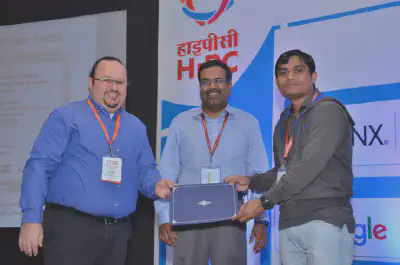CSE Explores the Boundaries of HPC, Data Science, and India


As 2017 drew to a close, several faculty and alumni from the School of Computational Science and Engineering (CSE) traveled across the globe to attended two conferences in India – The 24th IEEE International Conference on High Performance Computing (HiPC2017), held in Jaipur, and the IEEE International Conference on Machine Learning and Data Science (ICMLDS2017) in Greater Noida.
CSE Professor and Associate Chair Ümit Çatalyürek served as the program chair of HiPC2017, which, coincidentally, was where he presented his first peer-reviewed paper in 1995. Now, 22 years later, Çatalyürek oversaw all aspects of the conference, from the technical program – with a committee of more than 100 individuals – that featured three keynote talks and 41 papers, selected from over 180 submissions. CSE Chair David Bader and CSE Professor and IDEaS co-Director Srinivas Aluru are members of the HiPC Steering Committee and attended the conference.
“The quality of the papers was very good this year and I was very happy. It can be challenging to attract such good submissions when you have HPC conferences in locations that are not historically known for being pillars for that field of research,” said Çatalyürek.
Among these papers, was CSE Professor Srinivas Aluru’s, Parallel Exact Dynamic Bayesian Network Structure Learning with Application to Gene Networks, which earned a best paper finalist award.
CSE recent graduate, Devaret Makkar, presented the paper Exact and Parallel Triangle Counting in Dynamic Graphs, which discusses a new dynamic graph algorithm for counting triangles, on behalf of co-authors CSE Research Scientist Oded Green and CSE Chair David Bader.
Several days before HiPC2017, Bader attended ICMLDS2017, the first of an international conference series hosted by Bennett University, where he participated as as a keynote speaker.
Bennett University was established – just 18 months ago prior to the conference – as a startup academic venture in the suburbs of Delhi. It was founded by The Times Group, a conglomerate that owns several media brands throughout India.
One of these brands, The Economic Times, interviewed Bader about his keynote at ICMLDS2017, publishing it in the paper the next morning. The Times of India, the sister platform to The Economic Times, also interviewed Bader about 5G abilities and published the Q&A online.
The Times Group established Bennett University as an independent institute with the goals of revitalizing the research industry, addressing research needs across the region, and ultimately encouraging economic development of the country. The university, still in its infancy, hosted the conference as a means to introduce those in academia, industry, and international audiences, to the new concept.
“The Times of India realized they needed a competitive advantage to encourage economic development of the country. In order to accomplish this with the creation of Bennett University, they gave the new school latitude to higher faculty and started collaborative research labs that are often joint with industry. In computing, they’ve started labs centered around companies such as Dell, NVIDIA, and others,” said Bader.
“One area they are investing in is using HPC for data science, and they have formed unique departments at the interface of traditional disciplines similar to our school [CSE] at Georgia Tech.”
https://www.cc.gatech.edu/news/602745/cse-explores-boundaries-hpc-data-science-and-india